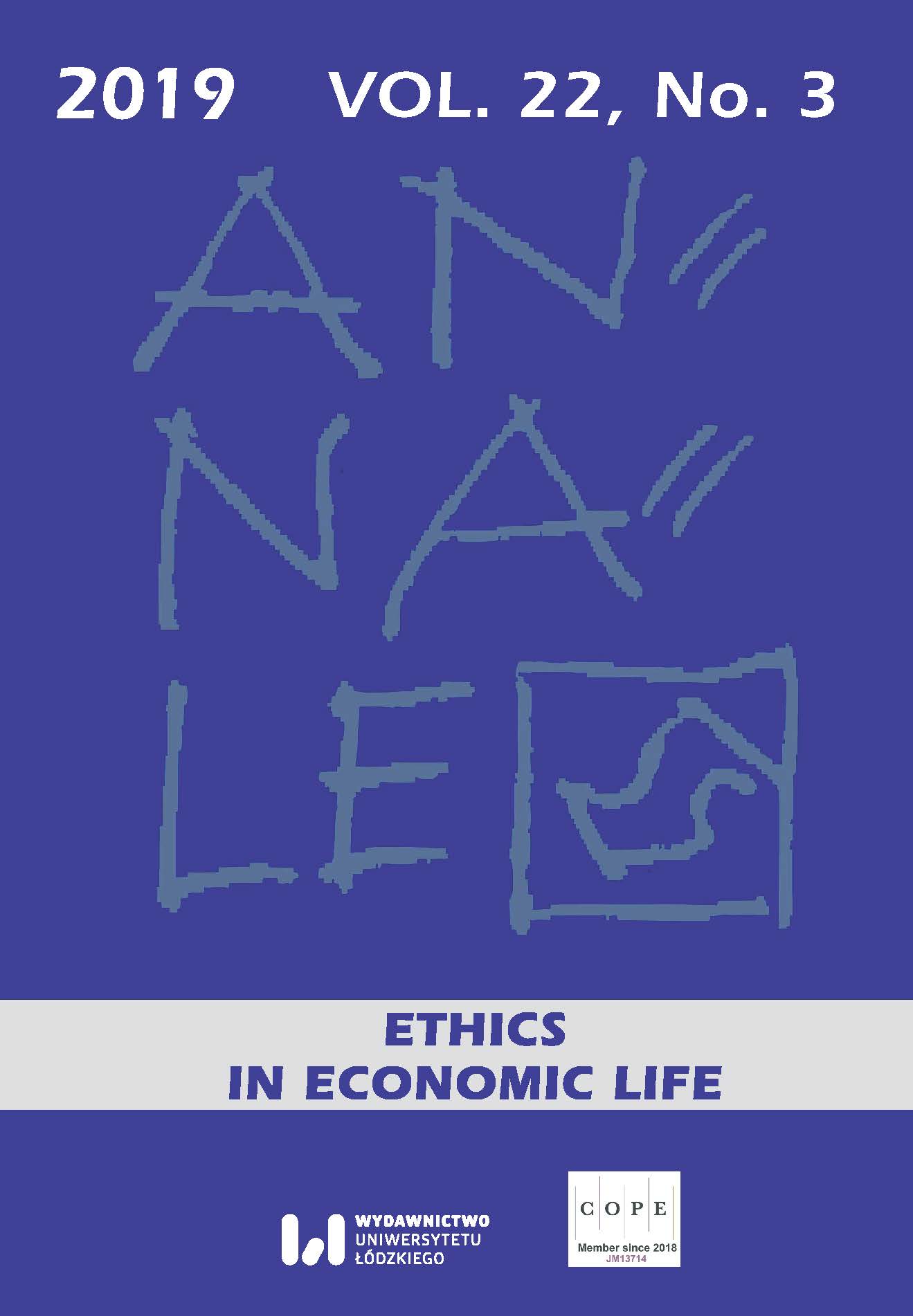Relacje między etyką, prawem i ekonomią: analiza poglądów Adama Smitha
DOI:
https://doi.org/10.18778/1899-2226.22.3.01Słowa kluczowe:
government, jurisprudence, natural law, ethics, impartial spectatorAbstrakt
Adam Smith is commonly viewed as the founding father of economics. This conviction stems from the publication of The Wealth of Nations in 1776. Smith’s works are chiefly examined in terms of economics. The discovery of reports of his Lectures on Jurisprudence and defining them as a “bridge” between his ethics, law and economics allows researchers to analyze Smith’s work from a fresh perspective. The aim of the paper is to discuss complex relationships between ethics included in The Theory of Moral Sentiments and general principles of law and economics. The main conclusion of this paper is that Smith emphasized the mutual complementation of moral and legal norms in the context of the economic development of the commercial society.
Bibliografia
Brühlmeier, D. (2004). Adam Smith. Warszawa: DIG.
Google Scholar
Buława, P., & Szmit, K. (2012). Ekonomiczna analiza prawa. Warszawa: Wolters Kluwers.
Google Scholar
Chodorowski, J. (2002). Adam Smith (1723–1790). Życie i dzieło autora badań nad naturą i przyczynami bogactwa narodów. Wrocław: Wydawnictwo Uniwersytetu Wrocławskiego.
Google Scholar
Dubber, M.D. (2005). The police power: Patriarchy and the foundations of American government. Nowy Jork: Columbia University Press.
Google Scholar
Dziadzio, A. (2002). Powszechna historia prawa. Warszawa: Wydawnictwo Naukowe PWN.
Google Scholar
Greenspan, A. (2005). Adam Smith. speech held at Adam Smith Memorial Lecture. Kirkcaldy, Scotland. Speech from Board of Governors of the Federal Reserve System (U.S.).
Google Scholar
Haakonssen, K. (1989). The science of a legislator: The natural jurisprudence of David Hume and Adam Smith. Cambridge University Press.
Google Scholar
Hanley, R.P. (2009). Adam Smith and the character of virtue. Cambridge University Press.
Google Scholar
Hühn, M.P. (2019). Adam Smith’s philosophy of science: Economics as moral imagination. Journal of Business Ethics, 155(2), 1–15. https://doi.org/10.1007/s10551-017-3548-9
Google Scholar
Young, J.T. (2005). Unintended order and intervention: Adam Smith’s theory of the role of the state. History of Political Economy, 37(5), 91–119.
Google Scholar
Klimczak, B. (1993). Etyka gospodarcza. Wrocław: Wydawnictwo Akademii Ekonomicznej im. Oskara Langego.
Google Scholar
Lis, R. (2014). Ku społeczeństwu cywilnemu i bogactwu narodów. Główne koncepcje polityczne i prawne szkockiego Oświecenia. Kraków: Wydawnictwo WAM.
Google Scholar
MacCormick, N. (1981). Adam Smith on law. Valparaiso University Law Review, 15(2), 243–263.
Google Scholar
Mahoney, P.G. (2017). Adam Smith, prophet of Law & Economics. Journal of Legal Studies, 46(1), 207–236.
Google Scholar
Markwart, A. (2017). Bogactwo uczuć moralnych. Jednostka i społeczeństwo we wzajemnych oddziaływaniach w perspektywie filozofii Adama Smitha. Toruń: Wydawnictwo Naukowe Uniwersytetu Mikołaja Kopernika.
Google Scholar
Okan, M. (2017). How did it all begin? Adam Smith on the early and rude state of society and the age of hunters. European Journal of the History of Economic Thought, 24(6), 1247–1276.
Google Scholar
Piqué, P. (2016). Adam Smith on governance and regulation. An account of his lectures on jurisprudence. Journal of Governance and Regulation, 5(4), 90–98. http://doi.org/10.22495/jgr_v5_i4_p8
Google Scholar
Pogonowska, B. (1996). Kategoria racjonalności w teoriach podmiotowych makroekonomii. Poznań: Akademia Ekonomiczna.
Google Scholar
Przybyła, H. (2005). Adam Smith – prekursor etyki gospodarczej. Studia Ekonomiczne, 35, 11–49.
Google Scholar
Ratajczak, M. (2014). Współczesne teorie ekonomiczne. Poznań: Wydawnictwo Uniwersytetu Ekonomicznego.
Google Scholar
Sandmo, A. (2011). Economics evolving. A history of economic thought. Princeton University Press.
Google Scholar
Sen, A. (2010). Adam Smith and the contemporary word. Erasmus Journal for Philosophy and Economics, 3(1), 50–67. https://doi.org/10.23941/ejpe.v3i1.39
Google Scholar
Smith, A. (1869) Adam Smith, Lectures on justice, police, revenue and arms. Oxford: Clarendon Press.
Google Scholar
Smith, A. (1954). Badania nad naturą i przyczynami bogactwa narodów. Warszawa: Państwowe Wydawnictwo Naukowe.
Google Scholar
Smith, A. (1989). Teoria uczuć moralnych. Warszawa: Państwowe Wydawnictwo Naukowe.
Google Scholar
Smith, V.L. (1997). The two faces of Adam Smith. Southern Economic Journal, 65(1), 2–19. https://doi.org/0.3366/jsp.2017.0153
Google Scholar
Stigler, G.J. (1971). Smith’s travels on the ship of state. History of Political Economy, 3(2), 265–277. https://doi.org/10.1215/00182702-3-2-265
Google Scholar
Zabieglik, S. (1997). Wiek Doskonalenia. Z filozofii szkockiego oświecenia. Zeszyty Naukowe Politechniki Gdańskiej, 558, 8–48.
Google Scholar
Zirk-Sadowski, M. (2011). Wprowadzenie do filozofii prawa. Warszawa: Wolters Kluwer.
Google Scholar
Pobrania
Opublikowane
Jak cytować
Numer
Dział
Licencja

Utwór dostępny jest na licencji Creative Commons Uznanie autorstwa – Użycie niekomercyjne – Bez utworów zależnych 4.0 Międzynarodowe.









